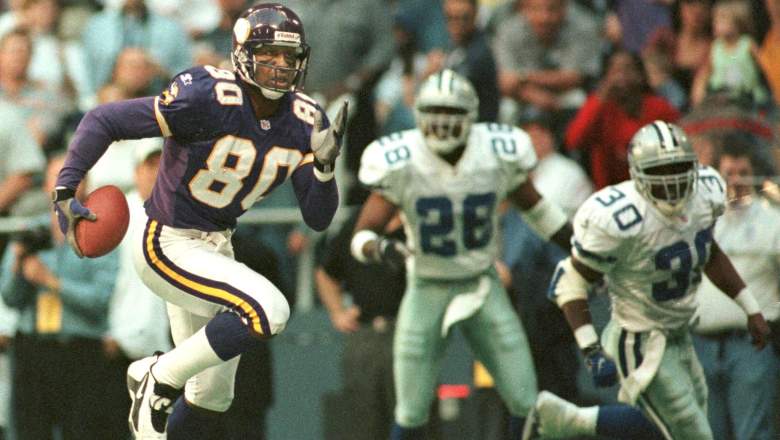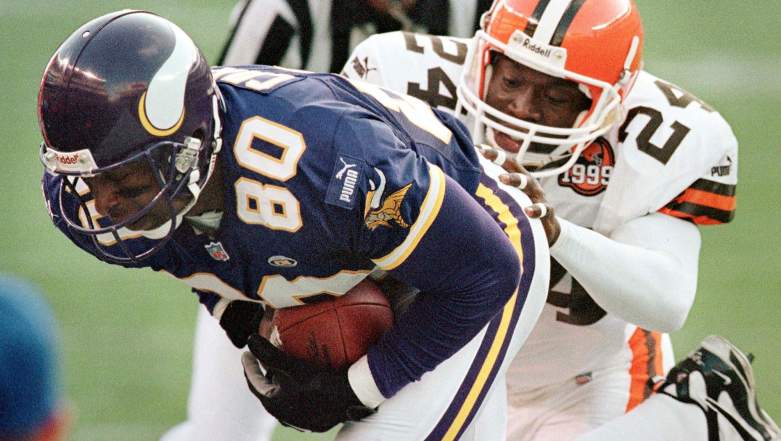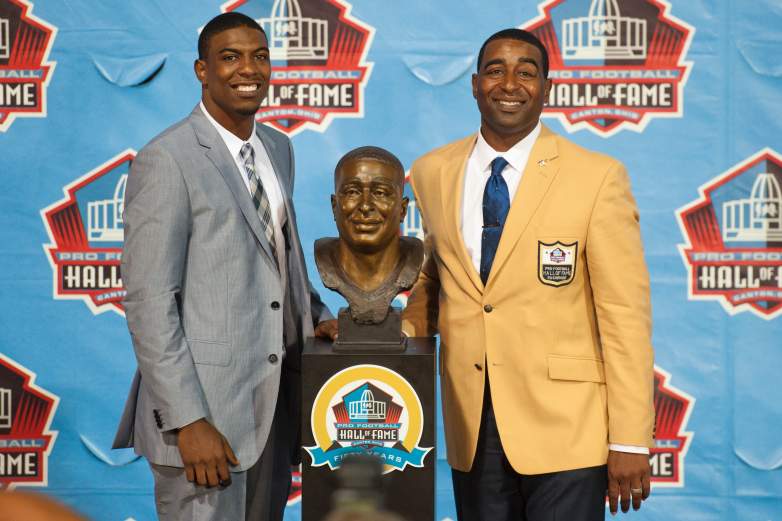
The Minnesota Vikings didn’t draft Cris Carter, but they sure reaped the benefits, signing him off waivers for $100 in 1990.
Carter was drafted by the Philadelphia Eagles in the 1987 supplemental draft and was later cut and picked up by the Vikings. He eventually became the only supplemental draft pick to ever be inducted in the Pro Football Hall of Fame.
For that reason, CBS Sports’ Chris Trapasso ranked Carter No. 1 of his top 10 supplemental draft picks in NFL history.
“Carter had a phenomenal run of eight-straight 1,000-plus yard seasons — which justifiably ended with Pro Bowl selections — and a pair of first-team All-Pro distinctions in 1994 and 1999,” Trapasso said. “He once led the league in receptions and three times had the most receiving touchdowns in football. His 130 career receiving scores still rank(s) fourth in NFL history, and he’s one of 18 pass-catchers with 13,000 or more yards in his career.”
The supplemental draft allows teams to select players who were barred from entering the regular draft in the spring, often due to academic issues or NCAA and substance-abuse violations.
Follow the Heavy on Vikings Facebook page for the latest breaking news, rumors and content!
Cris Carter’s College Eligibility and Past Drug Use

GettyCarter overcame shady sports agents and substance abuse before he became a Vikings legend.
Carter was a standout receiver at Ohio State, leading the No. 7-ranked Buckeyes to a Big 10 Championship his junior year. He could have declared for the draft but instead returned his senior year to chase the Heismann Trophy and improve his draft stock, Bleacher Report said.
Before Carter’s junior year, his brother, George, opened a letter from a pair of seedy sports agent, Norby Walters and Lloyd Bloom, with a proposal that World Sports & Entertainment Inc. would represent Carter.
Carter was offered an interest-free loan in monthly payments for the rest of his college career as part of a post-dated contract that locked college athletes in until they reached their big payoff in the pros. The agency had ties to Michael Franzese, a New York mobster who pressured athletes who tried to switch agents or had second thoughts, according to Bleacher Report.
After a Chicago-based sports agent was found beaten unconscious and stabbed, the FBI opened an investigation, leading to Carter being subpoenaed and eventually ruled ineligible for his senior year.
Carter was the only player of 44 athletes charged in the FBI investigation. He was convicted of mail fraud and obstruction of justice, leading to a $15,000 fine and 600 hours of community service.
Carter had three varying seasons after he was drafted in the fourth round of the 1987 draft. After catching five passes in his first year, Carter had 39 receptions for 761 yards and six TDs in the following year and scored 11 touchdowns in his third season.
Despite his affinity for finding the red zone, Carter was cut by the Eagles after failing three drug tests. Carter credits Eagles coach Buddy Ryan for giving him the wake-up call he needed to shake his past and begin to focus solely on football.
“Buddy Ryan drafted me, and he tried to grow me up in the league,” Carter said during his Hall of Fame induction in 2013. “What Buddy Ryan did was the best thing that ever happened for me when he cut me…”
Redemption in Minnesota

GettyCris Carter at his Pro Football Hall of Fame induction ceremony.
The Minnesotan Vikings took a chance on Carter knowing his off-field issues. Former team counselor Betty Triliegi challenged Carter that he would not drink for one week on Sept. 19, 1990 — the last day Carter has ever had a drink, Bleacher Report said.
Carter pushed himself to be better than San Francisco 49ers wide receiver Jerry Rice, training before Rice would at 7 a.m. on the West Coast, according to Bleacher Report. His hard work and determination helped him finish the decade with 835 receptions, second only to Rice.
His relentless chase of Rice led to him leading the Vikings in all-time receptions (1,004), receiving yards (12,383) and touchdowns (110), while also helping the Vikings make five consecutive playoff appearances from 1995 to 2000.
READ NEXT: Cris Carter Fights to Keep Families Fed
Follow Trevor Squire on Twitter: @trevordsquire
Comments
Vikings Hall of Famer Named Best Supplemental Draft Pick of All Time